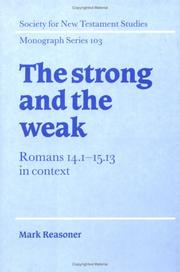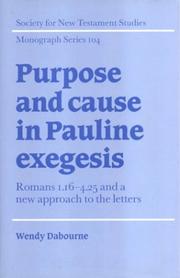| Listing 1 - 4 of 4 |
Sort by
|

ISBN: 0521633346 9780521633345 Year: 1999 Volume: 103 Publisher: Cambridge Cambridge University press
Abstract | Keywords | Export | Availability | Bookmark
 Loading...
Loading...Choose an application
- Reference Manager
- EndNote
- RefWorks (Direct export to RefWorks)
Book
ISBN: 8810302230 9788810302231 Year: 1999 Volume: 35 Publisher: Bologna Dehoniane
Abstract | Keywords | Export | Availability | Bookmark
 Loading...
Loading...Choose an application
- Reference Manager
- EndNote
- RefWorks (Direct export to RefWorks)
Book
ISBN: 2600003479 9782600003476 Year: 1999 Volume: 13 13 Publisher: Genève Droz
Abstract | Keywords | Export | Availability | Bookmark
 Loading...
Loading...Choose an application
- Reference Manager
- EndNote
- RefWorks (Direct export to RefWorks)
Bible. --- Commentaries --- Early works to 1800. --- Calvin, Jean, --- 227.1*1 --- Brief van Paulus aan de Romeinen --- 227.1*1 Brief van Paulus aan de Romeinen --- Calvin, Jean, - 1509-1564

ISBN: 0521640032 0521018935 1107115973 0511171870 0511004974 0511149379 0511309627 0511487940 1280432330 051105131X 9780521640039 9780511004971 0511036086 9780511036088 9780511149375 9780511487941 Year: 1999 Volume: 104 Publisher: Cambridge : Cambridge University Press,
Abstract | Keywords | Export | Availability | Bookmark
 Loading...
Loading...Choose an application
- Reference Manager
- EndNote
- RefWorks (Direct export to RefWorks)
Three factors prompt this re-examination of the underlying questions that shape mainstream exegesis of Paul's letters. Hermeneutical studies have destabilized assumptions about the nature of meaning in texts; the letters are usually characterized as pastoral but explicated as expressions of Paul's thought; and the impact of E. P. Sanders' work on Paul has sharpened exegetical problems in Romans 1.16-4.25. The outcome is a two-step method of exegesis that considers a letter first in the light of the author's purpose in creating it and second as evidence for the patterns of thought from which it sprang. The passage appears as pastoral preaching, helping the Romans to deal with the implications of the fact that the God of Israel is now accepting believing Gentiles on the same basis as believing Jews. Justification by grace through faith emerges as the theological understanding of God's action in Christ that grounds pastoral speech.
Bible --- Criticism, interpretation, etc --- Socio-rhetorical criticism --- 227.1*1 --- 227.1*1 Brief van Paulus aan de Romeinen --- Brief van Paulus aan de Romeinen --- Bible. --- Criticism, interpretation, etc. --- Socio-rhetorical criticism. --- Arts and Humanities --- Religion
| Listing 1 - 4 of 4 |
Sort by
|

 Search
Search Feedback
Feedback About
About Help
Help News
News